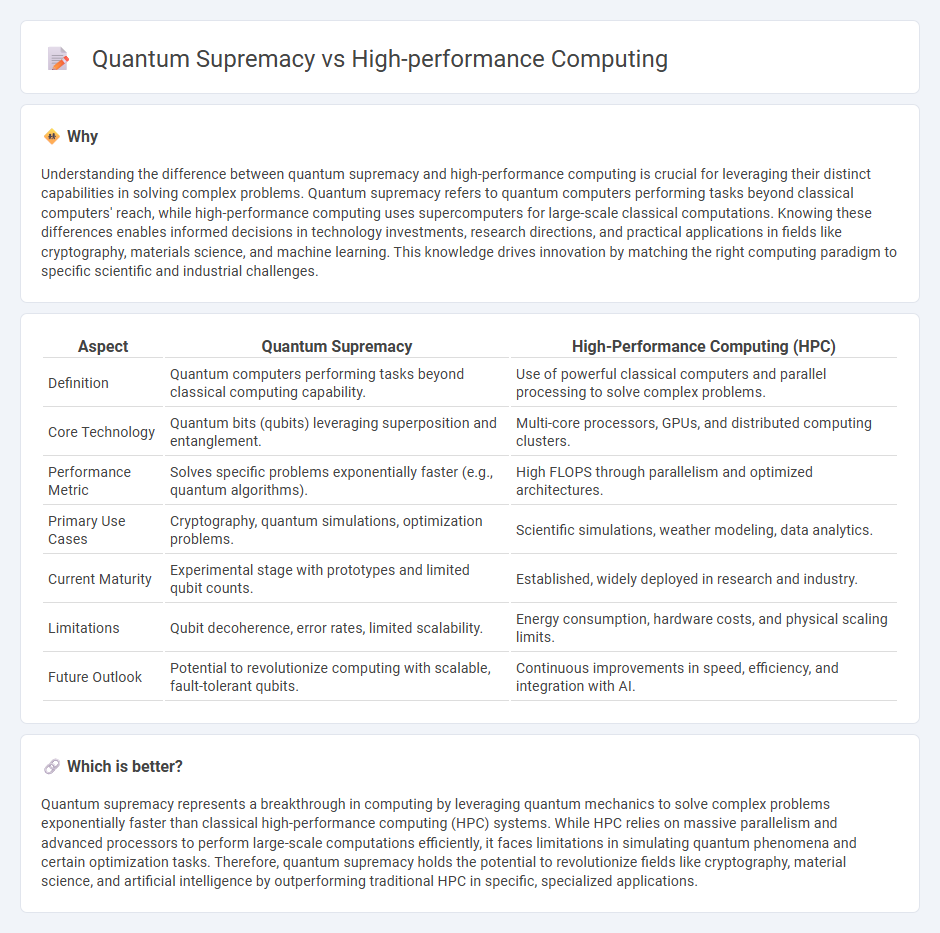
Quantum supremacy represents a breakthrough where quantum computers solve problems beyond classical supercomputers' reach, challenging the limits of high-performance computing (HPC). HPC relies on massive parallel processing and advanced hardware to tackle complex simulations, data analysis, and scientific research. Explore the evolving landscape of quantum supremacy versus HPC to understand future technological frontiers.
Why it is important
Understanding the difference between quantum supremacy and high-performance computing is crucial for leveraging their distinct capabilities in solving complex problems. Quantum supremacy refers to quantum computers performing tasks beyond classical computers' reach, while high-performance computing uses supercomputers for large-scale classical computations. Knowing these differences enables informed decisions in technology investments, research directions, and practical applications in fields like cryptography, materials science, and machine learning. This knowledge drives innovation by matching the right computing paradigm to specific scientific and industrial challenges.
Comparison Table
| Aspect | Quantum Supremacy | High-Performance Computing (HPC) |
|---|---|---|
| Definition | Quantum computers performing tasks beyond classical computing capability. | Use of powerful classical computers and parallel processing to solve complex problems. |
| Core Technology | Quantum bits (qubits) leveraging superposition and entanglement. | Multi-core processors, GPUs, and distributed computing clusters. |
| Performance Metric | Solves specific problems exponentially faster (e.g., quantum algorithms). | High FLOPS through parallelism and optimized architectures. |
| Primary Use Cases | Cryptography, quantum simulations, optimization problems. | Scientific simulations, weather modeling, data analytics. |
| Current Maturity | Experimental stage with prototypes and limited qubit counts. | Established, widely deployed in research and industry. |
| Limitations | Qubit decoherence, error rates, limited scalability. | Energy consumption, hardware costs, and physical scaling limits. |
| Future Outlook | Potential to revolutionize computing with scalable, fault-tolerant qubits. | Continuous improvements in speed, efficiency, and integration with AI. |
Which is better?
Quantum supremacy represents a breakthrough in computing by leveraging quantum mechanics to solve complex problems exponentially faster than classical high-performance computing (HPC) systems. While HPC relies on massive parallelism and advanced processors to perform large-scale computations efficiently, it faces limitations in simulating quantum phenomena and certain optimization tasks. Therefore, quantum supremacy holds the potential to revolutionize fields like cryptography, material science, and artificial intelligence by outperforming traditional HPC in specific, specialized applications.
Connection
Quantum supremacy marks a pivotal milestone in high-performance computing by demonstrating quantum computers' ability to solve problems beyond classical supercomputers' reach. This breakthrough leverages quantum bits (qubits) to perform complex calculations at unprecedented speeds, enhancing computational power exponentially. Integrating quantum algorithms with traditional high-performance computing architectures is set to revolutionize fields such as cryptography, materials science, and optimization tasks.
Key Terms
Parallel Processing
High-performance computing (HPC) leverages parallel processing by distributing complex computations across thousands of CPUs or GPUs to solve large-scale scientific simulations and data-intensive tasks efficiently. Quantum supremacy, achieved when a quantum computer performs a task beyond the practical reach of classical HPC systems, hinges on qubits exploiting quantum parallelism through superposition and entanglement, enabling exponential processing power growth for specific problems. Explore the evolving landscape of parallel processing in HPC and quantum supremacy to understand the future of computational capabilities.
Qubits
High-performance computing (HPC) relies on classical bits to process vast amounts of data through parallel processing architectures, achieving significant computational speeds for complex simulations and data analysis. Quantum supremacy is demonstrated by quantum computers utilizing qubits, which exploit superposition and entanglement to solve specific problems exponentially faster than classical supercomputers. Explore the fundamental differences in qubit functionality compared to classical bits to understand the future of computational power.
Superposition
High-performance computing (HPC) relies on classical processors designed for massive parallelism and optimized algorithms to solve complex simulations efficiently. Quantum supremacy leverages superposition, enabling quantum bits (qubits) to exist in multiple states simultaneously, dramatically increasing computational potential for specific tasks. Explore how superposition redefines problem-solving beyond traditional HPC limits by diving deeper into quantum computing advancements.
Source and External Links
What is High-Performance Computing (HPC)? - High-performance computing uses groups of cutting-edge computer systems to perform complex simulations, computations, and data analysis beyond the reach of standard systems, often leveraging parallel processing and advanced GPUs for tasks like scientific research and machine learning.
What is High Performance Computing - HPC enables processing data and performing complex calculations at extremely high speeds, using clusters or supercomputers with thousands of interconnected nodes for parallel processing, essential for scientific, industrial, and real-time applications.
What Is High-Performance Computing (HPC)? - HPC uses clusters of powerful processors working in parallel to process massive datasets and solve complex problems at speeds millions of times faster than standard systems, supporting advancements in fields like genomics, AI, and real-time analytics.
 dowidth.com
dowidth.com